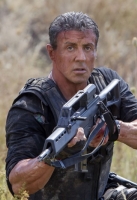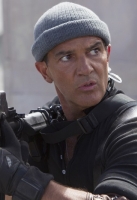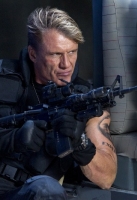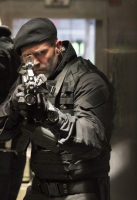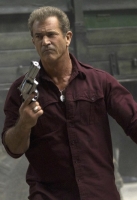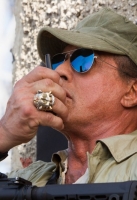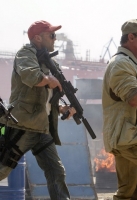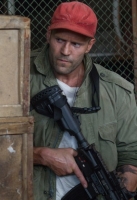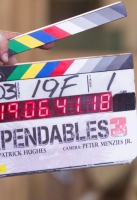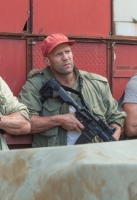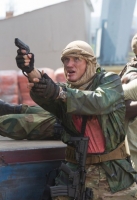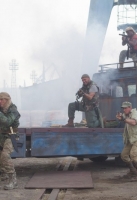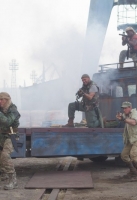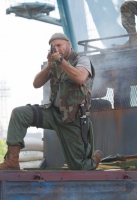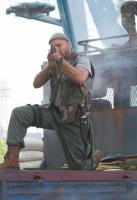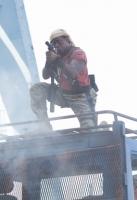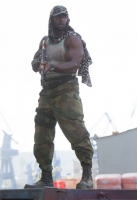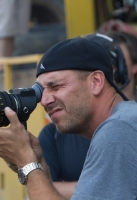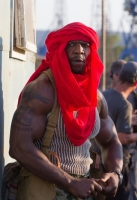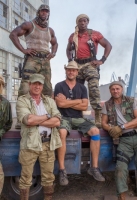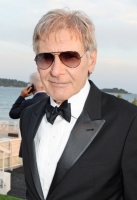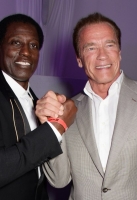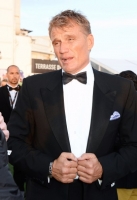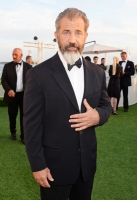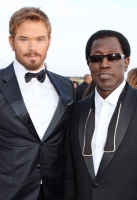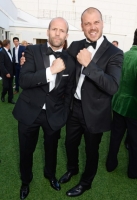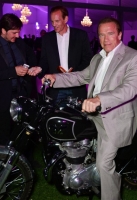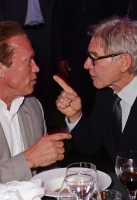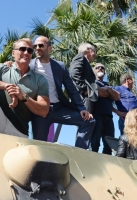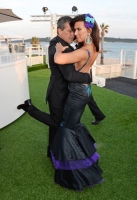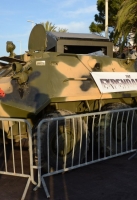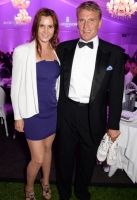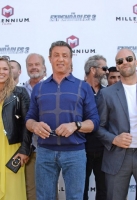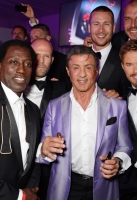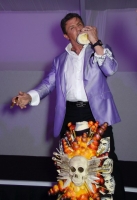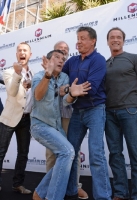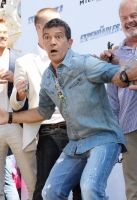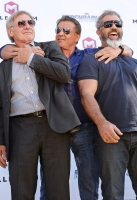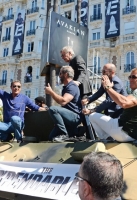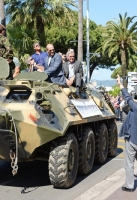Company Demands Transformers 4 Edits
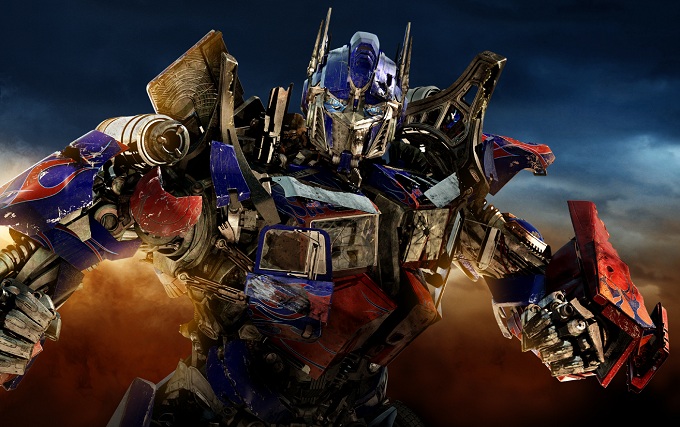
The Chinese owners of Pangu Plaza complex, a location featured in Transformers Age of Extinction are reportedly demanding that Paramount halts release of the film and make significant edits to remove any images of their properties and logos.
The demand comes in response to a dispute about a $1.6 million sponsorship deal. The Company had paid Paramount to ensure the giant dragon shaped hotel/retail complex would be featured prominently in the marketing of the film. Believing that paramount failed to honor that commitment the company is now retaliating with the demands.
It’s unwelcome news on the back of the film’s recent premieres in Hong Kong and Beijing, though ultimately unlikely to halt the film’s ongoing global promotions campaign.
Rian Johnson Directs Star Wars Episode 8 & 9
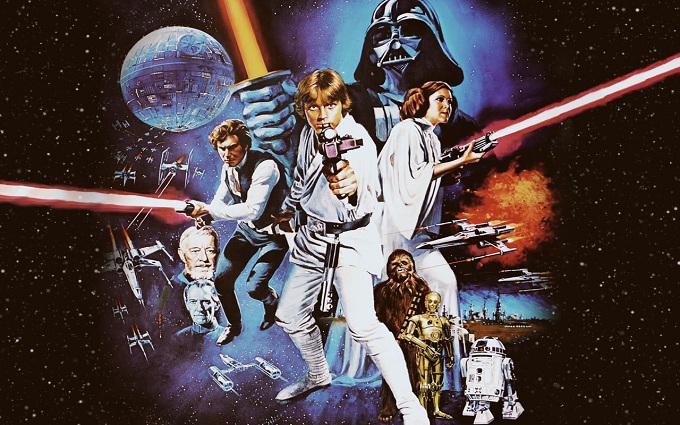
Looper and Brick Director Rian Johnson will apparently take over from J.J. Abrams to write and direct the next two chapters of Dinsey’s new Star Wars Trilogy. The acclaimed director will reportedly be taking responsibility for both Episodes VIII and XI.
The news was seemingly confirmed in the most amusing and subtle way by Johnson tweeting the below video clip of Scott Glenn in The Right Stuff. Fans will no doubt share the sentiment…
Johnson’s appointment will likely be welcomed by fans familiar with his previous work. Looper was an intelligent, original and brooding sci-fi blockbuster. He directed several episodes of the outstanding Breaking Bad and made an undeniably astonishingly accomplished debut with high school film noir homage Brick.
Johnson’s appointment also gives some indication that the new Star Wars saga will have perhaps a more mature and somber tone in-keeping with the finest traditions of Empire Strikes Back. Already hinted by the return of script writer Lawrence Kasdan. May the force be with them all.
Margot Robbie Talks Tarzan & Alexander Skarsgård
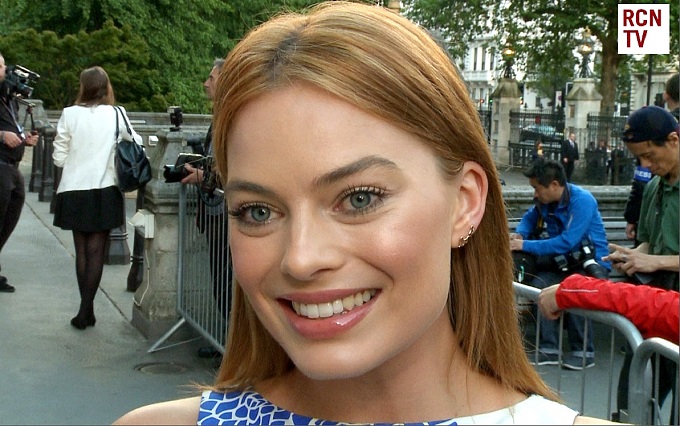
Wolf of Wall Street star Margot Robbie spoke to Red Carpet News at the One For The Boys Charity Fashion Ball event at the Natural History Museum in the heart of the Capital. The beautiful rising star is playing Tarzan’s love interest Jane opposite True Blood hunk Alexander Skarsgård in a big screen reboot of Edgar Rice Burrughs iconic hero. Directed by David Yates, Christoph Waltz and Samuel L. Jackson are also attached to star.
Talking about taking on the iconic role of Jane Porter Robbie was quick to point out she won’t be just a token damsel in distress:
“She’s quite independent, not so reliant on Tarzan. I kind of like the strong female characters. She’s definitely a strong character, very intelligent and fun. “
As for whether fans will see Alexander Skarsgård sporting Tarzan’s traditional loin cloth..
“No you won’t. It’s not really that kind of Tarzan movie. The costumes are actually wonderful…. It’s a slightly different take on the traditional Tarzan story so it takes place later on it’s not really about finding Tarzan in the jungle. But it’s a great sort of action, adventure and love story. “
As for what it’s like to work with the True Blood star Margot did admit to being literally and metaphorically swept off her feet:
“Yeah he’s really big. I look like a Hobbit next to him. We were doing a camera test next to him the other day and my fingertips were literally at his knee caps. I was like Oh my god! He’s really big… I think every girl on set is swooning over him!”
Actual Video Interview Below:
Utopia Series 2 Cast & Crew Interview
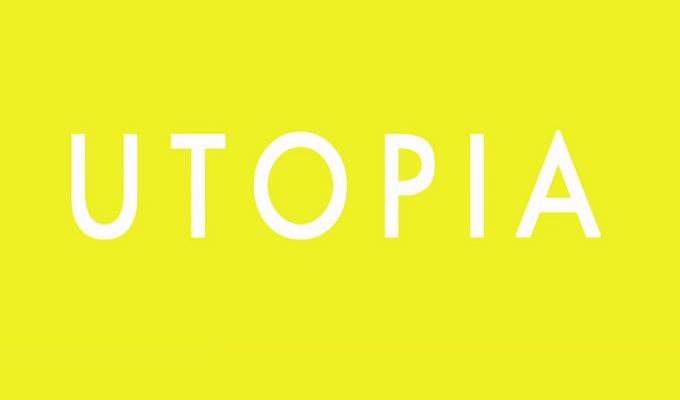
Red Carpet News attended a special preview screening at BAFTA in London for the second series of Channel 4′s sensational and utterly brilliant Utopia. The show made an astonishing debut with a first series that grabbed headlines for it’s through provoking subject matter, slick visuals and unapologetic violence. The new series comes back bigger and better to further explore the plans of shadowy organization The Network and those individuals fighting to stop their grand plans.
After watching the mesmerizing first two episode of the new series, we sat down with the cast and crew including writer Dennis Kelly, Director Marc Munden, Producer Rebekah Wray Rogers and stars Fiona O’Shaughnessy (Jessica Hyde) & Geraldine James (Milner). Read the full transcript below:
Q. The new series seems to blame the Network for Thatcherism?
Dennis - It seemed like a good thing to do. Also I suppose the Thatcher government was a very stable government and had written it later on It would have been a Blair government. So I’m not particularly having a go at Thatcherism, though.. maybe I am. I wanted to make a conspiracy from the start, so I needed to find a short time period where a lot of event happened. I found tis ten ay period where all those events actually happened. The assassination of Mino Paccarelli, and Eric Sykes, through to Three Mile Island. That just seemed the perfect week. It just fitted. So maybe it’s all real.
Q. Where did the idea come from to open the new series with a flashback episode exploring the origins of the characters?
Dennis - When we were doing series 1 Mark and Becca kept saying the stuff in the past was quite rich and it would be great to actually see some of it. I thought oh f*ck there’s an idea here. So I thought it would be really interesting to show all of it, to get a chance to see it starting. The central ideal behind the conspiracy comes from sort of a good place. They’re trying to solve the world’s problems and actually do something about it. I’m not suggesting what they do is right. I felt if you go right back and show that you could show that. To see the sacrifices that Milner and Carvell make to do this. I realised you couldn’t have the current actors play their younger selves though because that would just be too weird.
Q. How easy was it to cast the younger versions for the flashback episode?
Rebekah – I suppose obviously we were looking for people who looked like the characters we’d already seen in the first series. Our amazing casting director trawled the country to find people and we were very happy with the results.
Q. The series has such a distinctive look, how much fun was it to tailor that for the flashback episode?
Marc – Dennis had written a lot of real events in it and we knew that we were going to use a lot of archive footage. I thought this was an opportunity to make the fiction look like the archive materials. That was what was behind the frame size and aspect ratio. I also thought it would be fun to make it look almost like a 1970s photograph with the over saturated colours bleeding out.
Q. Did the flashback episode affect your view of the characters?
Geraldine - It did for me because the first episode shows us where Milner is coming from and how she got started down this path. You hadn’t seen that in the first series though it’s always been spoken about. After all that talk about what went on, to actually see those two meeting and the passion they had about this thing that they so strongly believe in. I think it was very helpful for me to pick Miler up again where we left her at the end of the last series. I think it’s amazing.
Dennis – It’s Interesting because I was watching the rushes come through as I was still working on the later episodes. Seeing things like Milner’s relationship with Wilson Wilson fed back into what I was writing.
Q. Was it easier returning for a second series?
Rebekah – In some ways I think it was easier because we knew each other very well. We’d been to hell and back together so we knew we could trust each other. What it also meant was that we knew quite what we were trying to achieve. We really decided that this series had to be better. Every production designer and production staffer decided well that was last time and it’s got to be even better. The challenges we set ourselves were far harder.
Marc – With the first series the writing was fully formed but we were still trying to find what the series was in terms of a piece of television. Actually when we started the second series we sort of had a nervous breakdown trying to make it better. That’s what happens.
Fiona - I found it easier because the first time I didn’t really know what we were making. There was a funny kind of atmosphere and we were all affected by the atmosphere of the script. Now we all kind of laugh about that. We were all kind of paranoid the first time.
Dennis – It feels easier to write in some ways with characters. Because once you have people inhabiting those characters it makes that part of things easier. I feel like I could just hand over a mini-series to the cast. But it’s difficult not to look back at what you’ve done before with the story and try to match it. Which is why I think it was better to go away and do something completely different with the first episode. Also you use up things in the first series, but that’s the challenge, to find new things without just reusing what worked the first time and changing it a bit to squeeze it back in. I don’t think I’ve done that too much.
Q. Is the second series less about revealing secrets and more about exploring the ideas and questions raised at the climax of the first series?
Dennis – In the first series you didn’t really know what the conspiracy was. The odd thing about the first series is that you didn’t find out about the theme of population control until episode 5. I enjoy as an idea and piece of work the fact it came so late. But I mean the series didn’t really talk about that until that moment. What was nice about this series is that it can be about that rom the start. Really although the series is about characters, the concept of population control is the idea that underpins all that. The first series was also a bit twisty as well and you didn’t always know quite what was going on. So you’re faced with the idea of finding new twists. I decided not to try and just do that, although there may be one or two little surprises. It’s not quite as twisty as the first series. It’s really about seeing how The Network works, how the people fighting it get on and whether they even should be trying to fight it.
Q. The series has a very flexible moral centre, who or what do you see as the heart of the show?
Dennis – I think morality is flexible and all big proper questions aren’t easily answered by the moralities we have. I like the fact it shifts for the audience and the characters. Sometimes good people do terrible things and Bad people do terrible things. Actually I look at Milner and I think she’s actually an incredibly good and interesting person. She’s the kind of person who’d be nice to go out for dinner with. It wouldn’t be nice if she wanted to kill you though, because she just f**king would!
I’m a bit woolly, lefty, intellectual and I feel like I know what going on in the world. I think I know how to answer everything. But nothing in what I believe gives me an answer to this question at the heart of the show. The population issue. I don’t know what we as a species do about it.
In 1974 when this story starts the world’s population is something like 4.5 billion. By the time we get to present day we’ve almost doubled. Not only that, the resources we use for our living standard have trebled. We’re also passing out living standards out to other people in the world who traditionally couldn’t afford or didn’t have access to them. So nothing in my politics or morality gives me an answer to this. That’s why it’s an interesting thing to talk about.
Q. Can you talk about the unique look of the series?
Marc – Yeah there’s a certain amount of colour in the sense that the world is quite heightened. We’ve used a lot of secondary colour correction to brighten things. The main thing about the first series was that the script was so epic in is scope and ideas that it had to have some sort of visual equivalent. I wanted to open it up into the landscape, there’s a lot of talk about that in the first series. It needs to be imbedded in those big wide shots. That feels more innate to the piece than the colours. There’s a definite colour palate, which is yellow, cyan and magenta. It’s the opposite of how you normally construct he colour I a TV which is Red, Blue and Green. It’s like an old Technicolor process.
Q. The Locations also give it an other worldly feel, can you tell us about that?
Rebekah – We travel a lot and we have an amazing locations manager. Utopia more than any other series I’ve ever come across goes from one location to another to another. By definition it has to because everyone is on the run.We went to Huddersfield, York, Liverpool and Scarborough. Also everything you see is doctored, it’s not usually how it was. There’s a lot of VFX to add extra things to shots to make them even more epic.
Marc – There’s 65 locations in the first three hours and double that by the end of series two. There are also a lot of invisible VFX shots and composites. For example, moving a giant glass pyramid building to the middle of a lavender field just to give it a heightened feel.
Q. Fiona where did you find Jessica’s voice and how was the character pitched to you?
Fiona - The physical range in her voice just happens because of the emotion. It just happens naturally. In the audition I actually pitched me they didn’t describe her at all. I just read the script and it was in there. They talked about Asperger’s, not that the character has it as an emotional condition though. Actually I think she’s probably the opposite of that, it’s just a method of survival she has that she’s so detached. I think she’s on all the time, she’s very raw and that’s it.
Q. Geraldine when you were approached for the role of Milner did you know what the character was going to become?
Geraldine - I had read the first 4 scripts and went to this meeting talking about this woman who was so caring and kind. I remember saying to Mark I think this is about mothers and their sons. Mark and Becky were sitting there going you should read the rest of this. I was holiday reading the rest of the script saying ‘Whaaat!” But when something so unexpected comes at you in a script like that or when you’re up for the part it’s honestly the most exciting thing that can happen to you as an actor. Because so often you see things on television and think, oh yeah I’ve seen that before. With this constantly for me there’s just completely surprising things happening. For me it was quite a surprise to find out who Mr Rabbit was. Still, pathetically perhaps having shot two series of this I still have to believe in what she’s aiming for. The killing isn’t really the action that she’s interested in. We have a real genuine problem with population control that nobody is going to address. She has found a way that she believes might begin to address it. There’s a terrible moment in the first episode where there’s talk of racial issues and that isn’t what she has in mind at all. What she’s doing is life. Unfortunately a lot of people have to go by the wayside to get it accomplished. But whatever.
Q. How important was it to develop specifically the Milner & Carver relationship?
Dennis - We talked about this a lot while I was writing the scripts. It’s a love story that isn’t a love story. There’s a line where someone says Milner loves Carvel’s brain and that it’s almost a higher form of love. It sort of what it is, but it’s more than a love story. I wanted to get the feeling that they were the two most special people on the planet. That’s what it feels like, when you fall in love it feels like there is nobody else who feels this way. In a strange way with them it’s actually true because they’re doing something that will affect all of humanity forever if they do it. It was really important to see that bond between them. It affects Jessica, Milner and Arby. The seeds planet in the 1970s affects this really peculiar family unit.
Q. Were you nervous about creating fictional stories around real life events?
Dennis – Everything that I used was an event with an existing conspiracy theory about them. The difference is the people who promote those theories believe they’re actually true. The fiction that’s applied to the same events here isn’t something we claim is real, we’re admitting it’s all fiction. We were careful about it and we thought about it but these are events that happened nearly 40 years ago. That’s part fo what we do actually we mess around a bit with reality. I didn’t have a eureka moment but it started with the realisation that the three mile island incident happened on the same day the Callahan government fell by one vote. Then you find out about the assassinations and deaths surrounding it. Once I looked at it all of that I couldn’t not use it. I’d never forgive myself if I didn’t.
Q. How did you approach writing all the action scenes?
Dennis – You try and write them in as much detail as possible without dong the director’s job for them. I never write specific shots. I never write the camera swoops in here because I know the director will just go f**k that. My job really is to write story in this strange form with stage direction and dialogue. So you write it with as much direction as possible but you also need to leave room for other people to bring their own thing to it. I’m not a director.
The actors are also very good at giving you feedback. They ask about things and why things are going on. Or they tell you they don’t agree with the way things are said or happening. You have a little fight about it maybe then they win. That sort of feedback is invaluable. Actors are into a character way more that I can ever be, I can be in it to a certain extent but then they’re so into it. It’s not about just doing things, if you don’t agree with something you have to fight your corner. But at the same time you have to be part of a collaborative process. I’m constantly and pleasantly surprised by what I see, it’s usually much better than what’s in my head.
Q. There was a lot of debate about the level of violence in the first series; you haven’t shied away form that this time either. Is it essential to telling this story to have those burst of violence in it?
Dennis – I think yes it is. The Network and Milner, what they’re trying to do is something they believe in so much. Milner’s question is really very simple and follows her throughout her entire life. Her question is, if I stop doing this what’s going to happen. What about the billions that live in the future that will have wars. Phosphates wil run out in about 100 to 300 years’ time. That’s great but without phosphates we don’t have food and we don’t have enough to support 8 billion or the 12 billion that will be here then. So Milner’s position is that obviously killing people is bad but what about all those other people. So I think you do need violence because you need it to tell the extremes of that story.
Q. Do you think the show may actually affect people’s feelings about having children?
Geraldine – I know people who have said they aren’t going to bring children into this world. Whether or not this show starts that process I think it is going to make people think about things and maybe talk about it. If it makes us start talking about it then that can’t be a bad thing.
Dennis – I’m certainly not advocating not having kids. I think kids are great. I don’t have ids but I have nieces and nephews and they’re all nice. I wouldn’t; want us not to have them. But this is why I think it’s an interesting thing to write about because I don’t have an answer. My answer isn’t the same as theirs. I don’t think we should sterilize the world. I want to be clear about that. But there are times when Milner asks, if not this then what do we do instead?
Q. Did you always intend to make more series, because series one felt quite self-contained?
Dennis - I think it was my mistake actually. A lot of people felt like it was intended to be a one off self-contained thing. But I’ve only written one other series before s it may be my naivety. I kept thinking I must have got something wrong that I didn’t let the audience know that there was another one coming up.
Q. Will there be a third series?
Dennis - Yes fingers crossed there will be. Touch wood!
Q. Will the graphic novel feature again; it was a big part of the plot in the first season?
Dennis - Well it was something that there and then burned and gone in the first series. But even if it went to series three and four, it would always be there in the background because it sort of set the tone for the show. It certainly influenced the visuals of the series. In a way it’s sort of there but in subtle ways. There’ a few things in the rest of the series that hark back to it.
The Expendables 3 Full Length Trailer
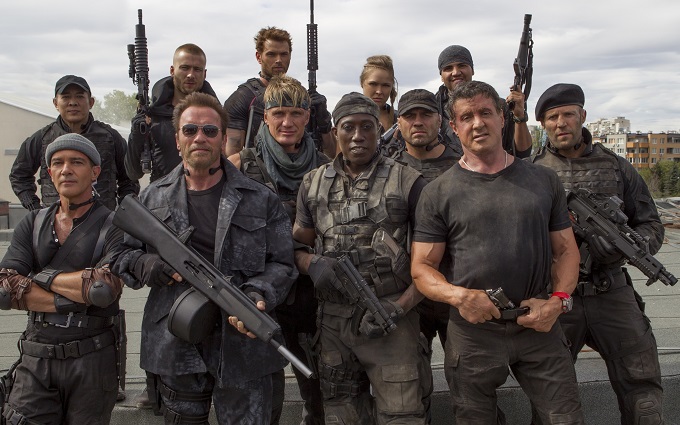
The Expendables 3 has a full length trailer now which shows off it’s big guns, big explosions and even bigger cast of action superstars. It gives fans a first proper look at Mel Gibson playing a vicious supervillain alongside franchise newcomers Harrison Ford, Kellan Lutz, Antonio Banderas and Wesley Snipes.
Gallery of Still shots and Cannes Film Festival pics below:
